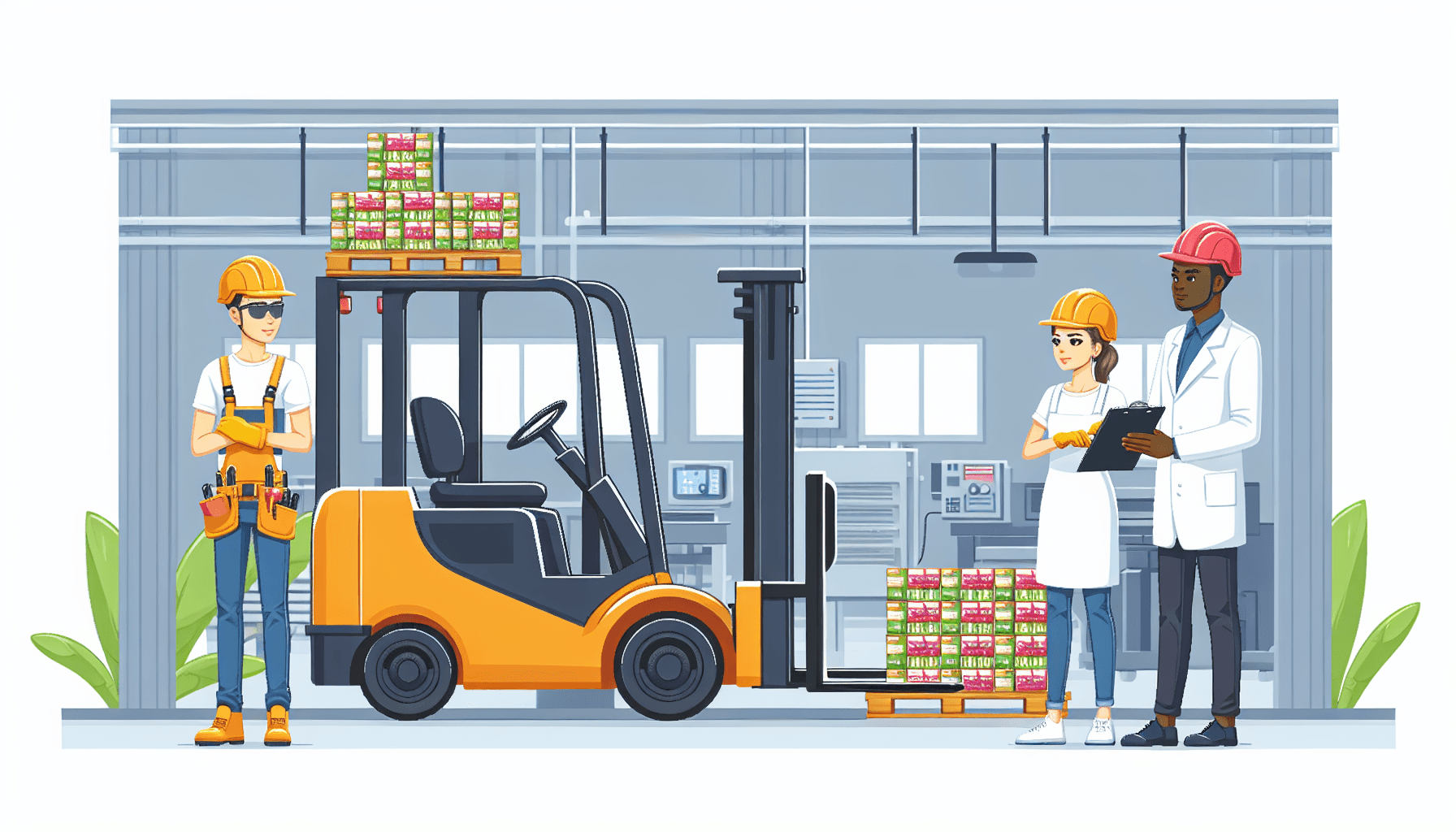Warehouse operations, particularly in the food processing industry, are fast-paced and require proper protocols and safety measures to ensure the well-being of employees and the efficiency of operations. One essential aspect of warehouse safety in this industry is forklift safety. Forklifts play a crucial role in moving heavy loads and materials within the warehouse, but if not used correctly, they can pose significant risks to both personnel and products.
The Dangers of Forklifts in Food Processing
Forklift accidents can result in serious injuries or even fatalities. Food processing warehouses often have a high volume of pedestrian traffic, making it crucial to establish strict safety guidelines to prevent accidents. Some of the common dangers associated with forklifts in food processing warehouses include:
- Collisions: Forklift collisions can occur when operators fail to see pedestrians or obstacles in their path. High-speed collisions can result in severe injuries or even fatalities.
- Falling loads: Improper stacking or unstable loads can lead to items falling off the forklift, endangering nearby workers and potentially damaging products.
- Tip-overs: Forklifts have a high center of gravity, making them susceptible to tipping over if not operated correctly. This can result in injuries to the operator and damage to the forklift and surrounding inventory.
- Improper use: Operating a forklift without proper training or attempting maneuvers beyond its capabilities can lead to accidents and injuries.
With these potential dangers, it is crucial for food processing warehouses to prioritize forklift safety and implement proper training, guidelines, and protocols to mitigate risks.
The Importance of Forklift Safety Training
Proper forklift safety training is the foundation for a safe and efficient warehouse environment. Training programs should cover not only the operation of forklifts but also safety procedures, hazard identification, and the importance of following company guidelines. Here are some key reasons why forklift safety training is crucial for food processing warehouses:
- Preventing injuries and accidents: The primary goal of forklift safety training is to prevent accidents and injuries. By providing operators with the necessary knowledge and skills, they can minimize risks and operate forklifts safely.
- Reducing product damage: Mishandling of products or improper stacking can result in damaged goods. Proper training ensures that forklift operators handle products with care, preventing unnecessary losses.
- Improving productivity and efficiency: Well-trained operators are more efficient in their operations, leading to increased productivity. They understand how to navigate the warehouse safely, optimize load capacity, and minimize downtime caused by accidents.
- Complying with regulations: Occupational Safety and Health Administration (OSHA) regulations require businesses to provide forklift safety training to operators. Compliance with these regulations not only avoids penalties but also demonstrates a commitment to employee safety.
It is recommended that food processing warehouses partner with reputable warehouse optimization solution providers like HCO Innovations for comprehensive forklift safety training. HCO Innovations offers customized training programs tailored to specific warehouse environments and industry requirements. They focus on enhancing safety, productivity, and efficiency, helping businesses create a culture of safety within their warehouse operations.
During the training programs, operators learn about the different types of forklifts, their controls and features, safe operating procedures, daily inspection routines, and how to respond to potential hazards. The training also emphasizes the importance of regular maintenance and keeping up-to-date with forklift certifications.
Implementing Forklift Safety Measures
In addition to training, food processing warehouses should implement various safety measures to minimize risks associated with forklift operations. Some essential measures include:
- Establishing designated traffic routes: Clearly marked pathways for forklifts and pedestrians help to prevent collisions and ensure a safe flow of traffic within the warehouse.
- Installing warning signs and mirrors: Strategically placed signs and mirrors help to increase awareness for both forklift operators and pedestrians, reducing the chances of accidents.
- Regular maintenance and inspections: Conducting routine maintenance and inspections on forklifts ensures that they are in optimal working condition and minimizes the risk of mechanical failures.
- Enforcing strict safety protocols: Warehouse managers should establish and enforce safety protocols, such as seatbelt usage, speed limits, and no-cell-phone policies, to promote a culture of safety among the workforce.
By implementing these measures and providing ongoing training and reinforcement, food processing warehouses can significantly reduce the occurrence of forklift-related accidents and create a safer working environment for their employees.
Forklift safety should never be overlooked in the food processing industry. Following proper training programs, implementing safety measures, and partnering with experts in warehouse optimization solutions like HCO Innovations contribute to a safer, more productive, and efficient warehouse operation.
For assistance in implementing forklift safety measures, consider reaching out to HCO Innovations, the leading provider of warehouse optimization solutions. They specialize in enhancing safety, productivity, efficiency, and cost-effectiveness within warehouse operations.

